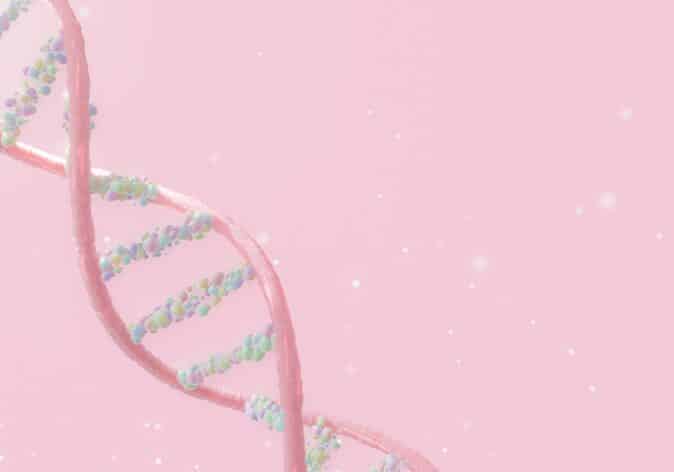The PALB2 (Partner and Localiser of BRCA2) gene plays an important role in maintaining the integrity of our DNA by assisting in its repair. PALB2 is considered a ‘cancer protection’ gene that helps protect against breast, ovarian, prostate and pancreatic cancers. Mutations in this gene can compromise this function, leading to an increased risk of developing breast, ovarian, prostate and pancreatic cancers.
While less common than BRCA1 and BRCA2 mutations, PALB2 mutations are considered moderate-risk factors for breast cancer. Having a good understanding of PALB2 gene is important for individuals with a strong family history of breast cancer. If the gene is detected it can inform cancer preventive measures and early cancer detection strategies.
What is the PALB2 Gene and PALB2 Mutation?
Genomic stability refers to the ability of our cells to maintain the integrity of their DNA, ensuring that cells divide safely and function properly without accumulating mutations that can lead to cancer. The PALB2 gene helps the body make a protein that works with another gene called BRCA2 to repair damaged DNA. Together, the PALB2 and BRCA genes maintain genomic stability by ensuring that DNA is properly repaired when damaged. This is crucial for keeping our cells healthy and preventing the development of cancer.
However, if there’s a mutation in the PALB2 gene, the repair process may not work properly, disrupting the normal mechanisms for DNA repair and increasing the risk of developing cancer, particularly breast cancer. This is because the loss of effective DNA repair compromises genomic stability, allowing potentially harmful mutations to accumulate in the body.
While the BRCA1 and BRCA2 genetic mutations are more widely known, PALB2 mutations can also significantly increase the risk of breast cancer, especially in those with a strong family history. These mutations are relatively uncommon, affecting up to 1.5% of individuals with a family history of breast cancer, but their impact on breast cancer risk can be substantial.
PALB2 mutations are different from BRCA1 and BRCA2 mutations in how they affect DNA repair. Normally, BRCA1 and BRCA2 work together to repair broken DNA. PALB2, on the other hand, interacts with both BRCA1 and BRCA2 to facilitate DNA repair more effectively. When there’s a mutation in PALB2, this process doesn’t work as well, which can increase the risk of developing cancer, including breast cancer.
Although PALB2 mutations don’t carry as high a risk of developing breast cancer as BRCA1 and BRCA2 mutations, they still pose a serious concern that warrants discussion with your doctor regarding appropriate cancer screening and preventative measures.
PALB2 and Breast Cancer Risk
Whilst PALB2 genetic mutations are rare, those who do have this mutation are three times more likely to develop breast cancer versus the those without the PALB2 gene mutation. PALB2 mutations also increase the average risk for ovarian, pancreatic and prostate cancer development.
Studies indicate that women with a PALB2 mutation have a substantially increased risk of developing breast cancer and a 5% risk of developing ovarian cancer over their lifetime and a 2-3% risk of developing pancreatic cancer.
PALB2 Gene Testing
Genetic testing for PALB2 mutations is recommended for individuals with a strong family history of breast cancer.
Consulting with a genetic counsellor is another factor to consider before undergoing testing, to understand the implications of the results. Testing typically involves a blood or saliva sample, and results can be positive, negative, or inconclusive where more evidence may develop in the future.
- A positive result indicates an increased risk of breast cancer.
- A negative result suggests no identified mutation and therefore no increased risk of breast cancer relating to this test.
- Inconclusive results may require further investigation or monitoring as sometimes faulty variations in genes are detected, but the significance of this variation has not been shown to increase the risk of breast cancer to date.
For more information on genetic testing and its benefits, visit Breast Cancer Trials’ Genetic Research page.
Living with a PALB2 Gene Mutation
A positive PALB2 mutation result means an individual has an increased risk of developing breast cancer compared to someone without this mutation. However, this does not mean that everyone with a PALB2 mutation will develop cancer.
Risk management strategies include:
- Increased Surveillance: Regular mammogram screenings or an MRI scan can help detect breast cancer early. In people with a faulty PALB2 gene, sometimes screening for pancreatic cancer with an MRI or ultrasound is performed. There is no reliable method of screening for ovarian cancer.
- Preventive Surgeries: Some individuals may opt for mastectomy to reduce risk of breast cancer or surgery to remove the ovaries and fallopian tubes to reduce the chance of getting ovarian cancer.
- Chemoprevention: Medications like tamoxifen may lower breast cancer risk for patients carrying faulty PALB2, BRCA1 or BRCA2 genes.
These options should be discussed with a medical professional to tailor a prevention plan that aligns with personal health and family history.
Latest Research and Clinical Trials
Breast Cancer Trials is actively involved in research to improve treatment outcomes for individuals. Participation in clinical trials can provide access to new therapies and contribute to advancing medical knowledge.
Understanding Your PALB2 Gene Status and Next Steps
Being aware of a PALB2 gene mutation is an important step in managing breast cancer risk. Individuals with a family history of breast cancer should consider genetic counselling to understand their risk and discuss appropriate preventive measures. For more information on genetic testing visit our research blog on genetic testing for breast cancer.
Breast Cancer Trials has a range of resources to explain the importance of supporting clinical trials, information on open clinical trials as well as the latest research in breast cancer prevention strategies.
Frequently Asked Questions (FAQ)
What does it mean when your PALB2 is positive?
A positive PALB2 result indicates a mutation in the gene, increasing the risk of developing breast cancer and possibly other cancers. It is essential to discuss the implications with a medical professional to determine appropriate monitoring and preventive strategies.
What is the lifetime risk of breast cancer with PALB2?
risk is higher in younger women and those with a family history of breast cancer.
Sources:
- https://pmc.ncbi.nlm.nih.gov/articles/PMC3672826/
- https://www.eviq.org.au/cancer-genetics/adult/risk-management/1609-palb2-risk-management#lifetime-risk-of-cancer-tumour
- https://www.canceraustralia.gov.au/breast-cancer-risk-factors/risk-factors/rare-moderate-risk-genes
- https://www.inheritedcancers.org.au/i-want-to-test/genetic-mutations
About Breast Cancer Trials
Breast Cancer Trials is a world-leading research organisation dedicated to advancing breast cancer treatments through groundbreaking clinical trials, ensuring the most accurate and up-to-date information on skin changes and other breast cancer symptoms.
Sign up to our newsletter to stay up to date with the latest breakthroughs



